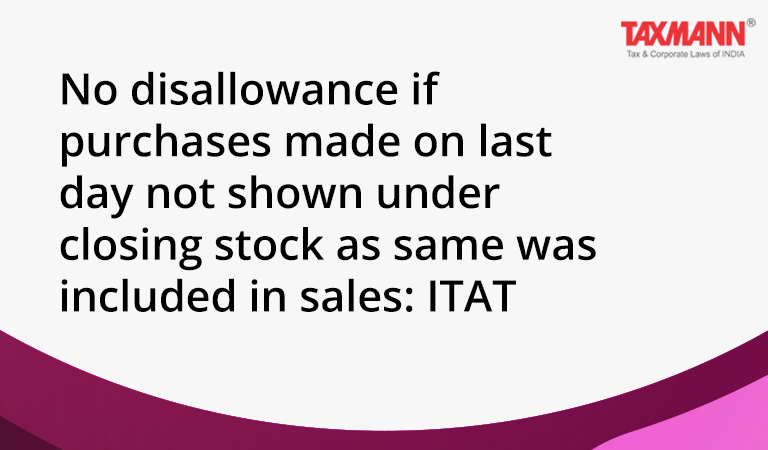No disallowance if purchases made on last day not shown under closing stock as same was included in sales: ITAT
- Blog|News|Income Tax|
- 2 Min Read
- By Taxmann
- |
- Last Updated on 12 December, 2022

Case Details: ITO v. Pravinbhai Manubhai Patel [2022] 145 taxmann.com 194 (Surat-Trib.)
Judiciary and Counsel Details
-
- Pawan Singh, Judicial Member & Dr Arjun Lal Saini, Accountant Member
- Anurag Dubey, Sr. DR for the Appellant.
- Sapnesh Sheth, CA for the Respondent.
Facts of the Case
The assessee was hired by GHV India Private Limited as a subcontractor for the development of the airport at Udaipur. GHV had been awarded the contract for this project by the Airport Authority of India, and in turn, they subcontract the construction work to the assessee.
During the assessment, the Assessing Officer (AO) allowed the assessee’s claim of expenditure spent on purchases of gitti from one ‘C’. Later, the AO reopened the assessment on the ground that said purchase was made on the last of March. Thus, the same should have shown the same as closing stock or work in progress as the goods were in transit from Udaipur. AO disallowed the claim of expenditure and added said amount to the income of assessee.
On appeal, the CIT(A) deleted addition. Aggrieved-AO filed the instant appeal before the Tribunal.
ITAT Held
The Tribunal held that the assessee in reply to AO explained that he was sub-contractor with GHV. AO instead of considering the contents of the reply straightway held that the assessee failed to establish why the goods in transit were not shown in work in progress or closing stock.
Before the CIT(A), the assessee submitted a similar submission. The CIT(A) after considering submission held that the assessee raised bill for the said material on GHV and the same was included in the sales figure. Thus, it could not be shown as closing stock.
He further held that the AO failed to give any reason to reject the submission of the assessee. He also held that there was no iota of evidence that the material was in transit.
In view of aforesaid it was apparent that AO passed the order in haste. It was also noted that the addition in question is made only for the reasons that some audit objection was raised. On perusal of the audit objection, it was found that such an objection was raised without application of mind.
Disclaimer: The content/information published on the website is only for general information of the user and shall not be construed as legal advice. While the Taxmann has exercised reasonable efforts to ensure the veracity of information/content published, Taxmann shall be under no liability in any manner whatsoever for incorrect information, if any.

Taxmann Publications has a dedicated in-house Research & Editorial Team. This team consists of a team of Chartered Accountants, Company Secretaries, and Lawyers. This team works under the guidance and supervision of editor-in-chief Mr Rakesh Bhargava.
The Research and Editorial Team is responsible for developing reliable and accurate content for the readers. The team follows the six-sigma approach to achieve the benchmark of zero error in its publications and research platforms. The team ensures that the following publication guidelines are thoroughly followed while developing the content:
- The statutory material is obtained only from the authorized and reliable sources
- All the latest developments in the judicial and legislative fields are covered
- Prepare the analytical write-ups on current, controversial, and important issues to help the readers to understand the concept and its implications
- Every content published by Taxmann is complete, accurate and lucid
- All evidence-based statements are supported with proper reference to Section, Circular No., Notification No. or citations
- The golden rules of grammar, style and consistency are thoroughly followed
- Font and size that’s easy to read and remain consistent across all imprint and digital publications are applied



 CA | CS | CMA
CA | CS | CMA
